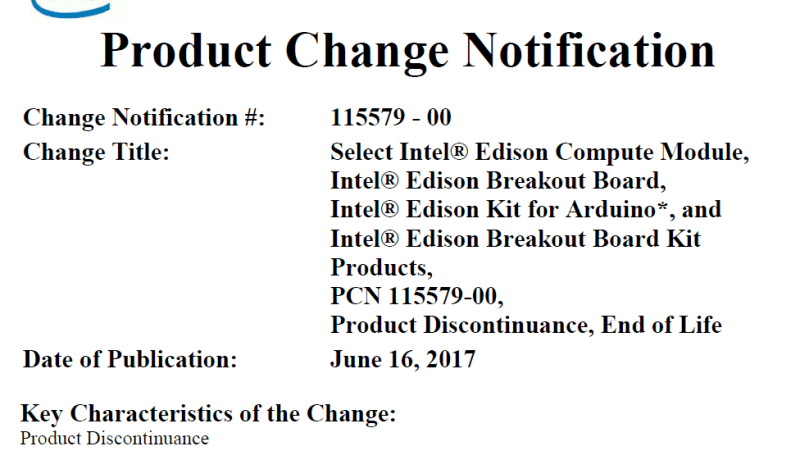Late spring cleaning at Intel, bins Galileo, Edison, Joule & Recon Jet
June 20, 2017
on
on

Not even three years after its noisy introduction at the 2014 Maker Faire in Rome, the Intel Edison module has been discontinued. The introduction of the Edison was accompanied by the launch of the Galileo 2, intended to replace the already failed Galileo 1. Apparently the second version didn’t do any better. The Joule module hasn’t even celebrated its first birthday and is binned already. Users who rely on one or more of these products can place last time orders (LTOs) until September 16, 2017.
Critics of the Edison claim that the module was not as powerful as a Raspberry Pi. They do forget however that when the Edison was released the Raspberry Pi was only at its Model B, generation 1+ level and has been evolving ever since. At the time of conception the Edison probably seemed like a good idea.
A lack of documentation is a second point advanced for the failure of the modules. Although it is true that this may severely hinder the success of a product, it doesn’t have to be a problem if the product is interesting enough in itself (like the ESP8266 from Espressif).
Then there are the ultra-miniature expansion connectors that no one can use...
The Recon Jet smart glasses (acquired by Intel in June 2015 for 175 million dollars) were binned together with the other Intel maker stuff. Only the Curie SoC found on the Arduino/Genuino 101 continues its life in maker space, but then again, that is a chip, and not a module targeted at… at ehm, yes, targeted at who exactly?
This is, I think, the real problem. Designed as products for seasoned engineers and marketed to hobbyist makers, they were probably doomed to fail. The number of views of this article will probably show too that nobody was really interested in these products.
Critics of the Edison claim that the module was not as powerful as a Raspberry Pi. They do forget however that when the Edison was released the Raspberry Pi was only at its Model B, generation 1+ level and has been evolving ever since. At the time of conception the Edison probably seemed like a good idea.
A lack of documentation is a second point advanced for the failure of the modules. Although it is true that this may severely hinder the success of a product, it doesn’t have to be a problem if the product is interesting enough in itself (like the ESP8266 from Espressif).
Then there are the ultra-miniature expansion connectors that no one can use...
The Recon Jet smart glasses (acquired by Intel in June 2015 for 175 million dollars) were binned together with the other Intel maker stuff. Only the Curie SoC found on the Arduino/Genuino 101 continues its life in maker space, but then again, that is a chip, and not a module targeted at… at ehm, yes, targeted at who exactly?
This is, I think, the real problem. Designed as products for seasoned engineers and marketed to hobbyist makers, they were probably doomed to fail. The number of views of this article will probably show too that nobody was really interested in these products.
Read full article
Hide full article

About Clemens Valens
Started working for Elektor in 2008 as editor in chief of Elektor France; was involved for a while with the Elektor websites and has since been active as technical manager of the lab. Is also editor for Elektor UK/US and Elektor Online.
>>



Discussion (0 comments)